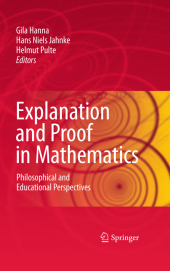 Neuerscheinungen 2014Stand: 2020-02-01 |
Schnellsuche
ISBN/Stichwort/Autor
|
Herderstraße 10
10625 Berlin
Tel.: 030 315 714 16
Fax 030 315 714 14
info@buchspektrum.de |

Gila Hanna, Hans Niels Jahnke, Helmut Pulte
(Beteiligte)
Explanation and Proof in Mathematics
Philosophical and Educational Perspectives
Herausgegeben von Hanna, Gila; Jahnke, Hans Niels; Pulte, Helmut
2010. 2014. viii, 294 S. 50 Tabellen. 235 mm
Verlag/Jahr: SPRINGER, BERLIN; SPRINGER US; SPRINGER 2014
ISBN: 1-489-98273-6 (1489982736)
Neue ISBN: 978-1-489-98273-5 (9781489982735)
Preis und Lieferzeit: Bitte klicken
Developments in the practice of mathematics have led to new types of proof and argumentation, challenging the established norms in this area. This book directs the attention of educational researchers to the newest developments in the philosophy and practice of mathematics.
In the four decades since Imre Lakatos declared mathematics a "quasi-empirical science," increasing attention has been paid to the process of proof and argumentation in the field -- a development paralleled by the rise of computer technology and the mounting interest in the logical underpinnings of mathematics. Explanantion and Proof in Mathematics assembles perspectives from mathematics education and from the philosophy and history of mathematics to strengthen mutual awareness and share recent findings and advances in their interrelated fields. With examples ranging from the geometrists of the 17th century and ancient Chinese algorithms to cognitive psychology and current educational practice, contributors explore the role of refutation in generating proofs, the varied links between experiment and deduction, the use of diagrammatic thinking in addition to pure logic, and the uses of proof in mathematics education (including a critique of "authoritative" versus "authoritarian" teaching styles).
A sampling of the coverage:
The conjoint origins of proof and theoretical physics in ancient Greece.
Proof as bearers of mathematical knowledge.
Bridging knowing and proving in mathematical reasoning.
The role of mathematics in long-term cognitive development of reasoning.
Proof as experiment in the work of Wittgenstein.
Relationships between mathematical proof, problem-solving, and explanation.
Explanation and Proof in Mathematics is certain to attract a wide range of readers, including mathematicians, mathematics education professionals, researchers, students, and philosophers and historians of mathematics.
Part I. Reflections on the Nature and Teaching of Proof
Chapter 1. The Conjoint Origin of Proof and Theoretical Physics
Hans Niels Jahnke
Chapter 2. Lakatos, Lakoff and Nú¤ez: Towards a Satisfactory Definition of Continuity.
Teun Koetsier
Chapter 3. Pre-Axiomatic Mathematical Reasoning: An Algebraic Approach
Mary Catherine Leng
Chapter 4. Completions, Constructions and Corrollaries
Thomas Mormann
Chapter 5. Authoritarian vs. Authoritative Teaching: Polya and Lakatos
Brendan Larvor
Chapter 6. Proofs as Bearers of Mathematical Knowledge
Gila Hanna & Ed Barbeau
Chapter 7. Mathematicians´ Individual Criteria for Accepting Theorems and Proofs: An Empirical Approach
Aiso Heinze
Part II. Proof and Cognitive Development
Chapter 8. Bridging Knowing and Proving in Mathematics: A Didactical Perspective
Nicolas Balacheff
Chapter 9. The Long-term Cognitive Development of Reasoning and Proof
David Tall & Juan Pablo Mejia-Ramos
Chapter 10. Historical Artefacts, Semiotic Mediation and Teaching Proof
Mariolina Bartolini-Bussi
Chapter 11. Proofs, Semiotics and Artefacts of Information Technologies
Alessandra Mariotti
Part III. Experiments, Diagrams and Proofs
Chapter 12. Proof as Experiment in Wittgenstein
Alfred Nordmann
Chapter 13. Experimentation and Proof in Mathematics
Michael D. de Villiers
Chapter 14. Proof, Mathematical Problem-Solving, and Explanation in Mathematics Teaching
Kazuhiko Nunokawa
Chapter 15. Evolving Geometric Proofs in the 17th Century: From Icons toSymbols
Evelyne Barbin
Chapter 16. Proof in the Wording: Two modalities from Ancient Chinese Algorithms
Karine Chemla


